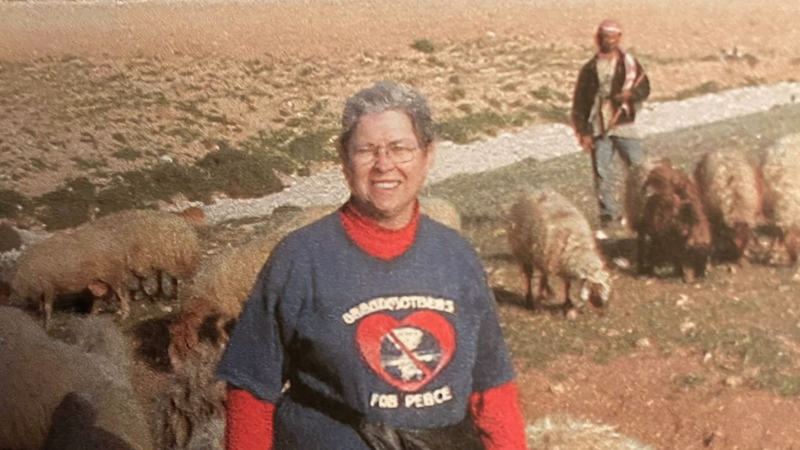The Electronic Intifada 15 August 2025

JoAnne Lingle in the Israeli-occupied West Bank. (Photo courtesy of Dianne Roe)
I lost track how many times JoAnne Lingle got in trouble with the law.
I remember her being escorted out of a US Senate confirmation hearing when she joined others in the activist group Codepink to disrupt a 2013 meeting to confirm John Brennan as CIA director.
You can see her addressing Brennan here. JoAnne held up a list of all the people killed by US drones.
Similarly, she was arrested in October 2017, blocking the entrance to the military base most associated with the operation of drone strikes, Creech Air Force Base, Nevada. The arrests went all the way back to the 1990s, if not before.
She was convicted for criminal trespass at Fort Benning, Georgia, because in 1995 she protested the base’s School of the Americas, which trained Latin American military personnel in counterinsurgency and covert operations.
In Indianapolis, Indiana, she frequently joined Arabs and Muslims in protesting for Palestinian freedom. A 2014 photo in The Indianapolis Star shows her using a megaphone to address a crowd at Monument Circle about Israeli military attacks.
She also stood up for Muslim immigrants during the first Trump presidency, protesting the so-called Muslim ban.
JoAnne did more than protest and get arrested.
She was part of a Christian Peacemaker Team in the West Bank that stayed for months at a time with Palestinians in order to act as outside observers of the Israeli occupation. JoAnne worked in Hebron escorting children to school, putting her body between students and Israeli soldiers and settlers when necessary. In the village of Beit Ummar, she was a witness on behalf of farmers attempting to access their land.
JoAnne was “adopted” by a family there and for years played a grandmotherly role in their lives, helping one of the children pursue his education in Indiana.
By any reckoning, this is a significant historical record of activism.
But her death on 2 May 2025 did not generate any press coverage or even an obituary in the local paper – she did not hold any official position that would warrant such media attention. JoAnne does not have a Wikipedia entry.
Special, not unique
I worry that the lack of public knowledge about her, her loss in the historical record, silences the evidence of a quiet, yet fierce example of activism not often associated in contemporary times with nice, white, Midwestern Christian women like JoAnne.
But JoAnne’s life demands such an accounting because it evidences how Americans from a variety of backgrounds have expressed grassroots solidarity with the Palestinian cause and with peacemaking more generally.
Neither the Republican nor Democratic Party represents the kind of anti-war politics of people like JoAnne Lingle because both parties tend to be in favor of US military dominance.
JoAnne’s example is also important because, like many other anti-war activists in the United States, her anti-war position was deeply informed by her faith.
JoAnne was a Bible-reading Christian who regularly attended a Mennonite church, prayed, and studied theology and ethics. She was devoted to her own religion while also supporting people of other faiths.
It was that solidarity with other people, based on her own theology, that led her to oppose US military intervention in Latin America and the Israeli occupation of Palestinian lands.
This vital spiritual life allowed her to commit acts of civil disobedience not out of anger, but out of love. She was prophetic in word, but peaceable in tone.
Brave in deed, but meek in surrendering to the authorities. Of course, she was upset about injustice, but those feelings never turned to rage.
Though JoAnne was special, she is not unique. Along with plenty of other Mennonites, Quakers, some Methodists, Episcopalians, Catholics, Lutherans, Presbyterians, Evangelicals and others, American Christians have a notable tradition of anti-war politics that has included solidarity with Palestinians for decades now, especially in their support of the boycott, divestment and sanctions (BDS) movement.
Most Americans do not associate faithful Christians like JoAnne Lingle with the cause of Palestinian freedom. But it is precisely that incongruity that should remind us to look more deeply at our true political diversity.
JoAnne is part of the long tradition of peace and justice-making in the United States that does not often make headlines. This is an American heritage worth preserving, and JoAnne Lingle’s life helps us rediscover it.
Edward E. Curtis IV is author or editor of 15 books, including the award-winning Muslims of the Heartland: How Syrian Immigrants Made a Home in the American Midwest.


